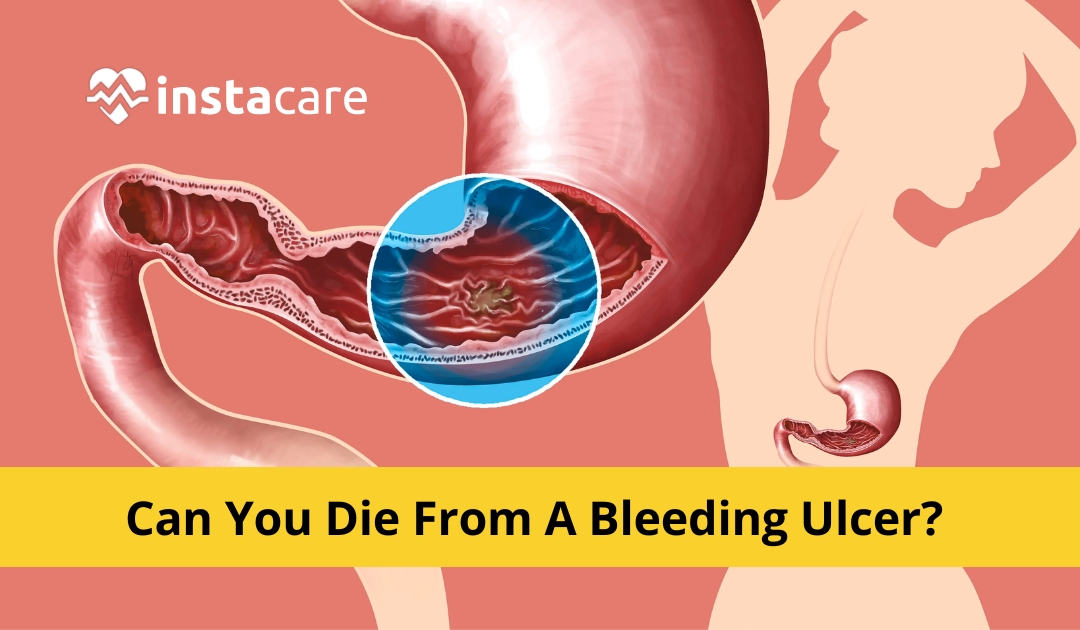An ulcer is a also wound that does not heal rapidly. C bleeding can occur if an ulcer forms near a blood artery. An emergency is excessive ulcer bleeding.
Peptic ulcers, which form in the digestive tract, are frequently meant when individuals use the term "ulcer." the word "peptic" denotes an association with acid.
There are three possible locations for peptic ulcers: the stomach, the small intestine directly above the stomach, or the esophagus (food pipe).
Peptic ulcers might bleed occasionally. Doctors refer to them as bleeding ulcers. Hemorrhaging, often known as severe bleeding, poses a hazard to life. Minor bleeding in an ulcer is usually not as dangerous and may go unnoticed. It still needs to be treated, though.
Critical details about bleeding ulcers include:
- The degree of a symptom varies. The upper abdominal or stomach is noticeably painful.
- Illnesses and some drugs can bring on bleeding ulcers.
- Doctors can treat bleeding ulcers with the appropriate therapy.
- Endoscopy is frequently used in the detection and treatment of bleeding ulcers.
View More: What Sweets Can You Eat With Acid Reflux and What to avoid
Symptoms of a bleeding ulcer
The symptoms of a bleeding ulcer may include:
- Abdominal pain: a person with a bleeding ulcer may experience sharp, burning, or gnawing pain in the middle or upper part of the abdomen.
- Nausea and vomiting: a person with a bleeding ulcer may feel nauseous and vomit, which can be bloody.
- Dark or tarry stools: a person with a bleeding ulcer may have dark, tarry stools due to the presence of digested blood in the stool.
- Weakness and fatigue: a person with a bleeding ulcer may feel weak and tired due to blood loss and anemia.
- Dizziness and fainting: in severe cases, a person with a bleeding ulcer may experience dizziness and fainting due to blood loss and low blood pressure.
If someone experiences indeed any of these symptoms, they should seek medical attention immediately. Prompt treatment can help prevent complications and potentially life-threatening outcomes.
Treatment for a bleeding ulcer
The treatment for a bleeding ulcer may depend on the severity of the condition. Treatment options may include:
- Medications to reduce stomach acid: proton pump inhibitors (ppis) and h2 blockers are commonly used to reduce stomach acid production and allow the ulcer to heal.
- Antibiotics: if a bacterial infection causes a bleeding ulcer, antibiotics may be prescribed to eliminate the bacteria.
- Endoscopic therapy: in some cases, an endoscope may be used to control bleeding by injecting medications, applying heat, or using clips to close the blood vessels.
- Surgery: in severe cases, surgery may be necessary to stop the bleeding and remove the ulcer.
- Blood transfusion: in cases of severe blood loss, a blood transfusion may be necessary to replace lost blood.
It is essential to follow the treatment plan the doctor prescribes and avoid any factors that may irritate the stomach lining, such as smoking and consuming alcohol. A bleeding ulcer can usually be healed with proper treatment, and the risk of complications can be reduced.
View More: 10 Causes Of Stomach Pain After Eating
Prevention of a bleeding ulcer
The following steps may help prevent a bleeding ulcer:
- Avoid certain medications: nonsteroidal anti-inflammatory drugs (nsaids), such as aspirin and ibuprofen, can irritate the stomach lining and increase the risk of developing a bleeding ulcer. Avoid these medications or take them with food or a ppi to reduce the risk.
- Quit smoking: smoking can irritate the stomach lining and increase the risk of developing a bleeding ulcer. Quitting smoking can help reduce the risk.
- Limit alcohol consumption: drinking alcohol can irritate the stomach lining and increase the risk of developing a bleeding ulcer. Limiting alcohol consumption or avoiding it altogether can help reduce the risk.
- Manage stress levels: stress can increase the production of stomach acid and irritate the stomach lining, increasing the risk of developing a bleeding ulcer. Managing stress through relaxation techniques, exercise, and therapy can help reduce the risk.
- Eat a healthy diet: eating a healthy diet rich in fruits, vegetables, and whole grains can help promote overall health and reduce the risk of developing a bleeding ulcer.
It is indeed essential to seek medical attention if you experience any bleeding ulcer symptoms, such as abdominal pain, nausea, vomiting, dark or tarry stools, weakness, fatigue, dizziness, or fainting. Early diagnosis and treatment can also help prevent complications and potentially life-threatening outcomes.
Conclusion
A bleeding ulcer is a severe medical condition that can be life-threatening if left untreated. The condition occurs when a sore develops on the lining of the stomach or small intestine, and the blood vessels in that area rupture, causing internal bleeding.
Please book an appointment with the Best Gastroenterologist in Lahore, Karachi, Islamabad, and all major cities of Pakistan through InstaCare, or call our helpline at 03171777509 to find the verified doctor for your disease.
Source: https://instacare.pk/blog/can-you-die-from-a-bleeding-ulcer


